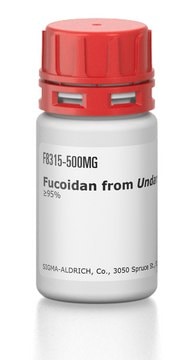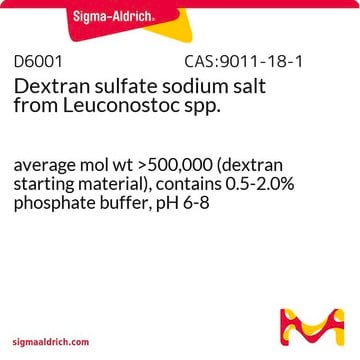F5631
Fucoidan from Fucus vesiculosus
Crude
Synonym(s):
Fucoidin
Sign Into View Organizational & Contract Pricing
All Photos(2)
About This Item
Recommended Products
biological source
algae (Fucus Vesiculosus)
Quality Level
form
powder
quality
Crude
color
light yellow to brown
solubility
H2O: 10 mg/mL, clear to hazy, faintly yellow to brownish-yellow
cation traces
Ca: ≤1%
Na: ≤ 8% (ICP)
storage temp.
room temp
Looking for similar products? Visit Product Comparison Guide
General description
Fucoidan is a fucose-rich, sulfated polysaccharide isolated from several species of brown seaweed.
Application
Fucoidan from Fucus vesiculosus may be used as a biological response modifier and as a potential therapeutic agent with a wide range of biological activities. It may be used to study its pharmacokinetics, safety, efficacy and methods of delivery as a potential anticancer, anti-immune and anti-inflammatory agent. Fucoidan may be used to assess its potential and formulations for tissue engineering applications.
Biochem/physiol Actions
Studies of fucoidan have found it to have a broad variety of biological activities including antitumor and antiangogenic activities, immunomodulatory, anti-inflammatory, anticoagulant, antithrombotic, and antioxidant activities. Fucoidan induces macrophage activation with subsequently activates mitogen activated protein kinases (MAPKs) and results in natural killer cell proliferation. Fucoidan acts as a nonselective selectin blocker and has been shown to induce apoptosis and suppress angiogenesis.
Preparation Note
Prepared by a modification of the method of Black, W.A.P., et al., J. Sci. Food Agri., 3, 122 (1952).
Other Notes
To gain a comprehensive understanding of our extensive range of Polysaccharides for your research, we encourage you to visit our Carbohydrates Category page.
Storage Class Code
11 - Combustible Solids
WGK
WGK 3
Flash Point(F)
Not applicable
Flash Point(C)
Not applicable
Personal Protective Equipment
dust mask type N95 (US), Eyeshields, Gloves
Certificates of Analysis (COA)
Search for Certificates of Analysis (COA) by entering the products Lot/Batch Number. Lot and Batch Numbers can be found on a product’s label following the words ‘Lot’ or ‘Batch’.
Already Own This Product?
Find documentation for the products that you have recently purchased in the Document Library.
Customers Also Viewed
Kazuo Azuma et al.
Marine drugs, 10(10), 2337-2348 (2012-11-22)
We evaluated the anti-tumor activities of the oral administration of fucoidan extracted from Cladosiphon okamuranus using a tumor (colon 26)-bearing mouse model. The materials used included low-molecular-weight fucoidan (LMWF: 6.5-40 kDa), intermediate-molecular-weight fucoidan (IMWF: 110-138 kDa) and high-molecular-weight fucoidan (HMWF:
Olesya S Vishchuk et al.
Food chemistry, 141(2), 1211-1217 (2013-06-26)
The sulfated polysaccharides from brown algae - the fucoidans - are known to be a topic of numerous studies, due to their beneficial biological activities including anti-tumour activity. In this study the effect of fucoidans isolated from brown algae Saccharina
Yong-Seok Han et al.
Marine drugs, 17(9) (2019-09-05)
Mitochondria are considered to be the powerhouses of cells. They are the most commonly damaged organelles within dopaminergic neurons in patients with Parkinson's disease (PD). Despite the importance of protecting neuronal mitochondria in PD patients, the detailed mechanisms underlying mitochondrial
Wei Wang et al.
Marine drugs, 10(12), 2795-2816 (2012-12-14)
Recently, the studies on the antiviral activities of marine natural products, especially marine polysaccharides, are attracting more and more attention all over the world. Marine-derived polysaccharides and their lower molecular weight oligosaccharide derivatives have been shown to possess a variety
Long Yu et al.
Food chemistry, 142, 197-200 (2013-09-05)
Structure of fucoidan from sea cucumber Acaudina molpadioides (Am-FUC) was investigated in this study. Low molecular weight polysaccharide of Am-FUC (Am-LMW) was prepared by enzymatic degradation and assayed by nuclear magnetic resonance. According to the structure of Am-LMW, and referring
Our team of scientists has experience in all areas of research including Life Science, Material Science, Chemical Synthesis, Chromatography, Analytical and many others.
Contact Technical Service














